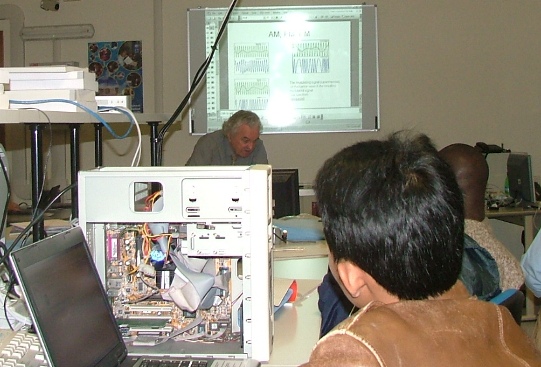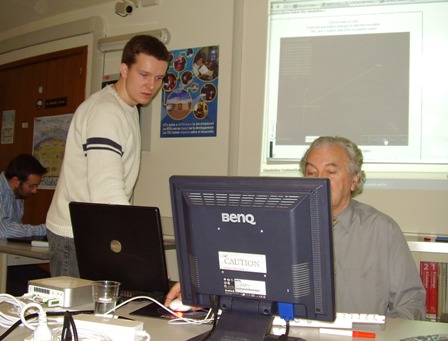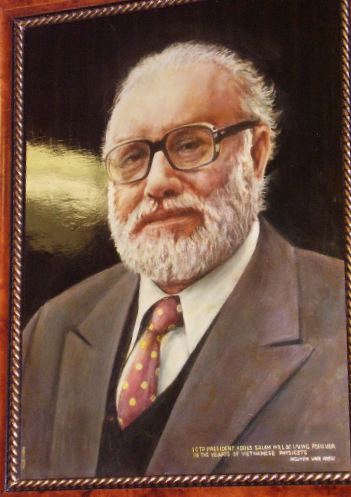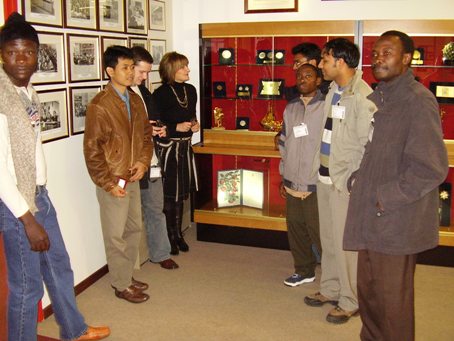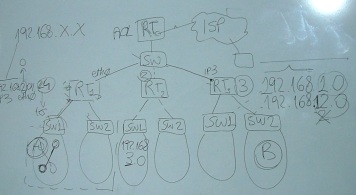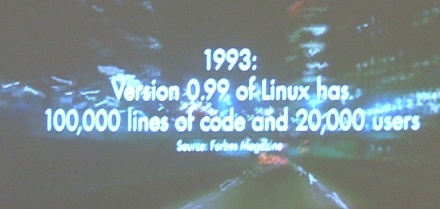Wednesday07 Group2
From School2007
 Dairy: Wednesday 07 February 2007
Dairy: Wednesday 07 February 2007
Contents |
[edit] Radio Communiation Channel and Digital Modulation
After Tuesday's dinner at Adriatico Guest House, the day started in earnest with Prof Struzak taking us through the rudimentary of radio communication channel and digital modulation by 9.00am. He paid tributes to his colleagues on their previous work on the same topic, but I was wondering the way he delivers a clearly orchestrated lecture with ease to the class. He is definitely a great teacher.
The causes of interference in radio communication was clearly expantiated and the various activities that usually takes place during modulation and demodulation were demystified. Basics of Radio transmitter and receiver were also taught. He emphasised on Modulation techniques used for transmission. Detection shemes and carrier recovery were explicitly explained.
We had a short coffee break in between his lecture for twenty minutes, He is very timely in the delivery of his lectures. He also tried all he could to carry all of along as he delivered the lecture. The picture shows Prof Struzak paying attention to a minute detail while members of the group pay greater attention listening to him.
During the course of the lecture, the Professor, definitely an adherent beiever in practicals, wanted to show us a page on the internet demonstrating the simulation provided by Agilent for modulation techniques, however, his laptop refused to open the page. Group two came into the rescue by getting the page on the internet and this was invariably displayed to the whole class.
The Group Two President is shown below with Prof Struzak when he was showing the Professor a real life digital modulation from the internet.
The class ended on a good note at 11.55am with a resouding applause for the Professor for a great performance!
[edit] ICTP Library
We were at the ICTP Library, in the Main Building between twelve noon and two o'clock. They have books in neighbourhood of 63000 volumes. So many journals are online, and with proper authetication of user, we can easily download them!
The Library is fully computerized and any attempt to even take a book out without prpoper authorization will give a beep att the door and except the bar code has been properly scanned into the computer indicating borowwing before one can successfully go though without such beep. This reminded me of the metal detectors at Malpensa airport, when I had to wait for over 10 hours and the various metal detectors I went through there! We were told how we can borrow books, search for books online, and we were later taking to the place where we were asked to help ourselves, we picked a lot of book from this place, waht a wonderful place to be. This book will definitely also add to our own library.
The library is also with a photocopying services, before you can photocopy you need to buy photocopying cards and get it inserted in the card reader to have access to the copier.
The founder Professor Abdus Salam was awarded a nobel prize for his contribution in 1979. So may awards he left behind were shown to us. He was a great scholar, no doubt about this, and definitely a wonderful visioner. We sincerely appreciate him and his family for giving us the opportunity to be here, because without his vision, we wont be here today. We were at his room, where we saw a great portrait of him and a lot of family picture, seminar pictures and so on and so forth.
The lady that took us round the Library was a great orator, however one can not expect less for a lady that has worked for about forty years at ICTP. She clearly demonstrated her admiration for the Prof whom she spoke glowing words about. The picture shows the librarian in the middle with member of the group taking picture with Prof Abdus Salam's collection of prizes, the Nobel prize is distinctly placed glowing at the bottom of the shelf.
[edit] Lunch
We had lunch at the Main building cafetaria which also houses the Library between 2.00pm and 4.00pm.
[edit] Network Exercises
C. Benvenuti led the class through a practical session on how to install linux after the day's lunch. We installed the ubuntu version 5.10, we went through the process of partioning the hard such as boot, home, swap, etc. The need for swap partition which is usually the double of the RAM to be at the middle of the partitioning was emphasized so as to incereased the computer memory management. Other basic rudimentaries needed for a successful installation of Linux was taught. We successfully installed the linux on our systems.
A networking exercise about routing and switching was given by the C. Benvenuti. The other two groups went out for consultations while we remained in the lab, we divided ourselves in to two sub-groups and we later agreed on a model for the design. We all agreed that since we can not have vlan we should opt for the feasible solution of using routers and switches to connect the 6 subgroups together. The proposal was successfully presented to the class by the Group's President.
However, after presentattion by the three groups have been critically examined, the lecturer gave us a lee way on how to go about the assignment. The picture below shows Benvenuti explaining the intricacies of router and switches to the class.
The lecture for the day ended on the high note for the group, when we were presented award by the organisers of the school for "best wiki page design" for the first two day of the school, They gave us the book titled Evolution and Convergence in Telecommunications (ICTP lecture Notes edited by S.M. Radicella and D.Grilli. Another book was later given to all participants titled "Introduction to International Radio Regulation" ICTP lecture notes 2003 written by Professor Struzak and edited by S.M. Radicella. Nobody went back empty handed. We sincerely appreciated what they did, and we do hope the awards will keep rolling in as the group put greater devotion to our studies.
[edit] THE GNU FILM
After dinner, we came to the lab at 9.00pm to watch a film titled "REVOLUTION OS", the movie was about open source OS, Linux Operating Systems, the GNU and people behind the scenes working assiduously to share their knowledge with all of us for free?
As we watched this film, here is a puzzle that came into my mind, "can we really say windows is more secure than open source software?" or the other way round? what is the answer to this puzzle? Kindly let us know.
Added by carlo I'm adding few references about this topic here, for further discussion: * http://en.wikipedia.org/wiki/Open_source_vs._closed_source#Security * http://articles.techrepublic.com.com/5100-10877-6064734.html * http://www.dwheeler.com/oss_fs_why.html#security * http://www.dwheeler.com/secure-programs/Secure-Programs-HOWTO/open-source-security.html my first answer anyway is: "there is no easy answer for such kind of question, maybe we can reformulate the question: what is security?" :-)
Thanks Carlo, like you rightly pointed out, it is a very contentious issue in the computer industry today, hope one day somebody will be able to convince the rest of us emphatically, that closed source is more secure than open source, methink presently that windows is basing his security on "if you cant see then you cant compromise", that is, the whole issue bore down to common sense? but how common is common sense? Another puzzle?
We went to bed after a great day for the group!
Kudos, kindly keep the good work up!!!
